Current Graduate Students
Entrance: 2025
Rylee Arena
rarena21@lakers.mercyhurst.edu
B.S. in Applied Forensic Science with a Forensic Anthropology concentration, minor in Physics
Mercyhurst University, Pennsylvania
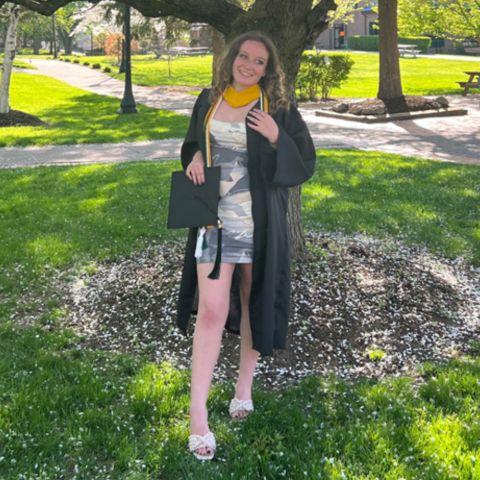
I earned my undergraduate degree in Applied Forensic Sciences at Mercyhurst University in 2022. I’ve always had a love and fascination for science and art, but when initially applying to college, I did not know exactly what I wanted to major in. I rolled the dice (quite literally) and ended up choosing forensics. After deciding to attend Mercyhurst, I was introduced to the specific field of forensic anthropology, which cohesively combined my interests. Additionally, I minored in Physics and discovered an innate interest in how machines work, which I love to apply to the human body and the world around it. Throughout my senior year, I gained experience assisting graduate students with their theses and attending a case with the M-FSRT, where my passion truly began to flourish. After graduating, I worked in two clinical laboratories, but realized quickly the extent to which I missed the field and desired to return to it. I gained extensive experience and skills working in the lab but knew I wanted to be hands-on at the scene as well. Upon graduating with my master’s, I plan to work as a medicolegal death investigator and eventually further pursue my education, either in a Ph.D. program or by earning my M.D., to practice forensic pathology and tie my current work experience to my education. My research interests include trauma analysis, human decomposition, and forensic taphonomy. I hope that by obtaining my master’s degree, I will be able to provide a voice to those previously silenced and bring closure to families with unanswered questions regarding their loved ones, as I believe no question should be left unanswered.
Juliana Bazdyrev
jbazdy42@lakers.mercyhurst.edu
B.A. in Anthropology with a Forensic Anthropology concentration
University of Montana, Montana
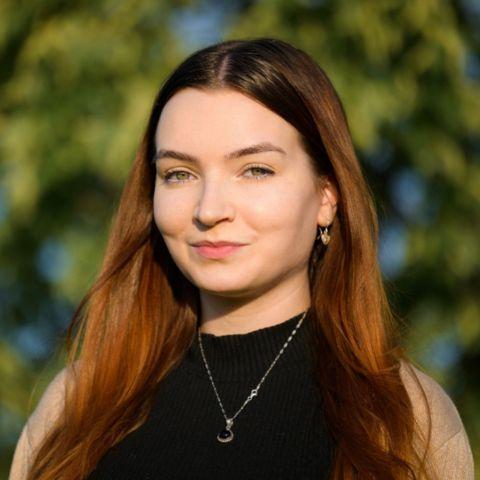
My path into forensic anthropology began unexpectedly during my time at Tacoma Community College. With no clear academic direction, an introductory course sparked an immediate fascination that led me to pursue the field. After completing two years of coursework, I transferred to the University of Montana, where I earned my Bachelor of Arts in Anthropology, graduating summa cum laude. While there, my involvement with the Criminology Club provided the opportunity to shadow an autopsy at a local crime lab. To expand my practical skills after graduation, I attended a bioarcheological field school in Croatia, where I gained hands-on experience in excavating and documenting historical gravesites alongside international experts. I was drawn to Mercyhurst University's program for its active casework and hands-on learning approach. Here, I aim to develop specialized expertise while strengthening my holistic understanding of forensic anthropology. My research interests center on developing and applying techniques used for posthumous identification, particularly in cases with limited antemortem data and disputed identification. I am especially interested in integrating methods such as forensic genetic genealogy to build a scientifically sound identity. My future career goals include working with a state agency or pursuing private contract work, with the potential to later pursue a Ph.D.
Macy Bourne
mbourn56@lakers.mercyhurst.edu
B.A. in Criminology and Anthropology, minors in Forensics and Psychology
West Virginia University, West Virginia
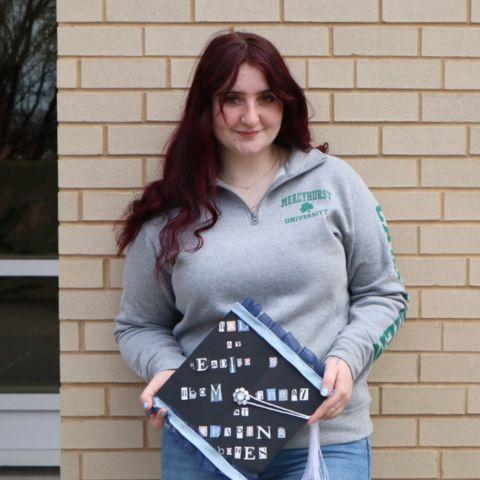
I attended West Virginia University, where I received my bachelor’s degrees in Criminology and Anthropology. While obtaining those degrees, I also minored in Forensics and Psychology. Originally, I was only majoring in Criminology with the two minors alongside it, until I realized I only needed two anthropology courses for my GEFs. I went to my advisor about what anthropology class I could take next, and she suggested that if I liked it that much, I should go out of my way to pursue it, and then I should add it as a major. That in itself opened so many doors for me. For example, during my undergraduate career, I was blessed enough to be accepted into the Historic St. Mary’s City field school in Maryland. There, I really got to explore the different realms of anthropology while mainly focusing on archaeology. While exploring these realms of anthropology, I found where I fit best: forensic anthropology. It became this poetic mix of everything I was studying in undergrad. Once I made that connection, I knew exactly what I needed to be doing in life and how I was supposed to get there, which brought me here to the Mercyhurst Forensic and Biological Anthropology graduate program. While at Mercyhurst, I would like to research trauma patterns on male and female skeletons due to sexual dimorphism, along with bite mark analysis. After I graduate from the program, I hope to get my certificate in medicolegal death investigation. The opportunities this program will open are endless, but I feel the need to pay homage to where I started. In the end, West Virginia may be covered in mountains, pepperoni rolls, and people saying y’all - it led me to anthropology, and for that I will forever be thankful.
Ashley Fields
afield10@lakers.mercyhurst.edu
B.S. in Anthropology, minor in Biology
Texas State University, Texas
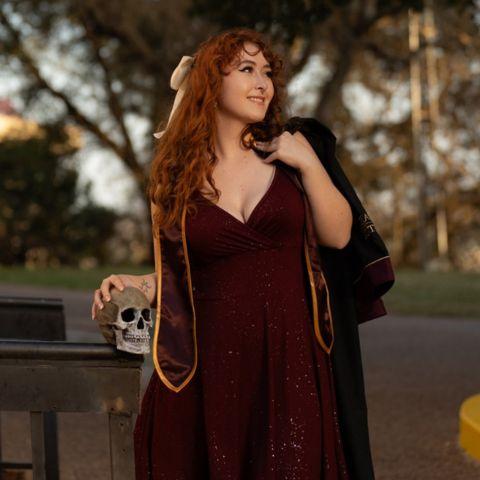
My name is Ashley Fields, and I just recently graduated with my Bachelor's of Science in Anthropology with a Biology minor from Texas State University! I have always been very interested in forensics, especially when it involves helping others. This is what led me to intern with various organizations throughout my undergrad, such as the Forensic Anthropology Center at Texas State, the Forensic Anthropology Research Facility, and especially Operation Identification. Being a part of an active forensic humanitarian organization really fueled my love for fieldwork and humanitarian aid. Through OpID, I was able to assist with multiple methods for human identification, repatriation, evidence collection, and burials along the Texas border. I also participated in studies within Texas State's vast skeletal collection and worked in their outdoor decomposition facility, which gave me a very unique undergraduate experience. Furthermore, I volunteered at the Osteological Research and Processing Laboratory for many years, processing the skeletons from the Texas State Body donation program. I am so thankful for all of the amazing experiences I had in my undergrad, and even more excited for the chance to expand my learning at Mercyhurst! I am interested in researching new methods of identification through the use of dental x-rays. I am deeply passionate about furthering aid to the Texas border, and my dream is to take everything I learn at Mercyhurst and come back to establish a Human Identification Center to aid in the mass crisis that is unfolding around my home.
Ella Griffith
egriff71@lakers.mercyhurst.edu
B.S. in Anthropology, minor in Criminology, and embedded certificate in Forensic Science
University of West Georgia, Georgia
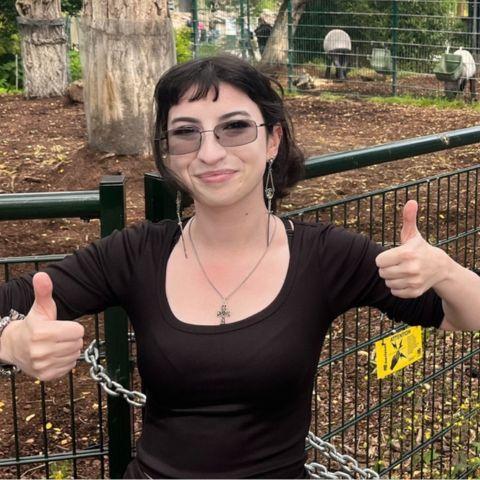
I was initially an artist studying Criminology at the University of West Georgia before I even knew what Forensic Anthropology was. After a chance conversation with the wonderful Dr. Corey Maggiano about my interest in cannibalism's traces throughout the archaeological record, I learned about the field and haven't looked back ever since. After switching my major, I quickly took all the high-level courses involving forensic and biological anthropology offered at my school and was honored to work as a student research assistant in the Biological and Forensic Anthropology Lab at UWG for three semesters. In my position, I was able to engage in student outreach and learn how to manage a skeletal lab while also engaging in my own research interests, involving both trauma associated with anthropophagy and postmortem dismemberment in modern prehistorical contexts, as well as the integration of art education in osteology. After a gnarly field experience and a final honors thesis, I knew that I wanted to continue the path to graduate school, and I am thrilled to be accepted to Mercyhurst for the Fall 2025 cohort.
My interests include forensic trauma analysis (specifically involving dismemberment trauma), forensic analysis in bioarchaeology, and osteological pathology. I have always said I did not want to make career choices until I saw where the path took me, but I would love to become a board-certified forensic anthropologist and engage in medicolegal death investigations in the United States or engage in forensic/bioarch research abroad. Anyway the wind blows, I’ll still be drawing bones.
McCarthy Lang
B.S. in Applied Forensic Science with a Forensic Anthropology concentration
Mercyhurst University, Pennsylvania
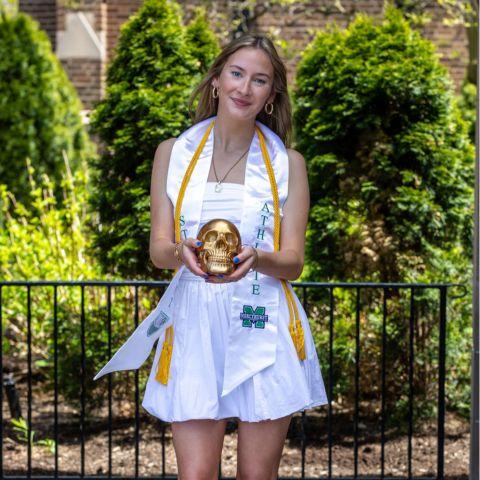
I developed an interest in death investigation during high school, initially considering careers in pathology or as a coroner. While attending my local community college, I enrolled in a forensic anthropology course that sparked my interest in the field and motivated me to transfer to Mercyhurst University to advance my education. At Mercyhurst, I earned a Bachelor of Science in Applied Forensic Science, with a concentration in Forensic Anthropology. During my studies, I was introduced to specialized areas within forensic anthropology, particularly forensic taphonomy and forensic archaeology, which emphasized the crucial role of forensic archaeological recoveries in the discipline. I also had the opportunity to process remains in the North East lab and gain extensive hands-on experience with the university’s osteological donor collection. My current research interests include forensic taphonomy, forensic archaeology, post-mortem interval, and trauma analysis. Upon completing my master’s program, I intend to pursue a Ph.D. in forensic anthropology to establish a career in medicolegal death investigation or as a forensic anthropologist.
Sydney Silas
ssilas53@lakers.mercyhurst.edu
B.S. in Anthropology with a Forensic Anthropology concentration, minors in Forensic Science and History
Baylor University, Texas
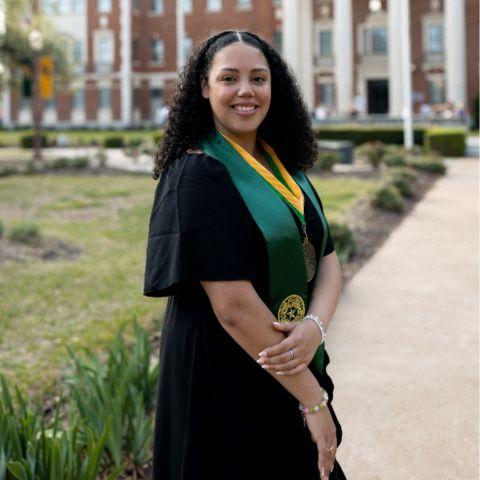
Originally from Houston, Texas, I attended Baylor University, where I earned my B.S. in Anthropology with a concentration in Forensic Anthropology and minors in both Forensic Science and History. My interest in criminal justice started in my younger years. As I went through high school, this interest expanded into forensic and biological anthropology with a particular curiosity towards ancestry. During my time as an undergraduate, I was afforded many opportunities to work in both academic and professional settings. For example, I worked as a teaching assistant for the Osteology Lab at Baylor University, and I was a part of the McNair Scholars program. My research subject within McNair involved analyzing the craniometrics of Hispanics as an admixed population, with a goal of finding a metric threshold of identification that can increase the accuracy of ancestry estimation. While I want to continue this route of research, I also want to include a historical and population genetic component to further explain and evaluate why individuals with Hispanic ancestry, depending on the region, are more or less likely to be misclassified. This work has a special place in my heart as I myself am an admixed individual with both African American and Mexican American ancestry. In the future, I hope to pursue a Ph.D. in Biological Anthropology with a career in academia, focusing on research and teaching.
Maureena Terven
mterve45@lakers.mercyhurst.edu
B.S. in Anthropology, minor in Sociology
Illinois State University, Illinois
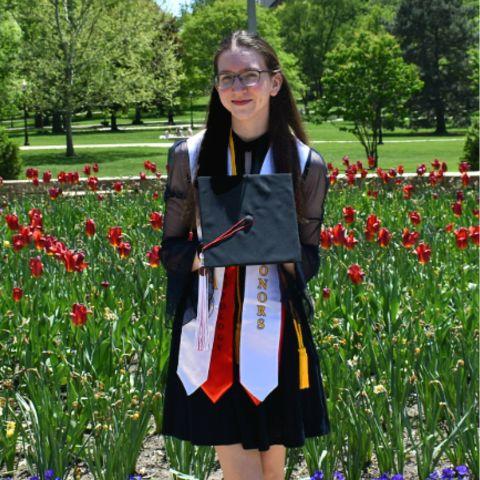
My name is Maureena Terven. I received my B.S. in Anthropology with a minor in Sociology from Illinois State University. Early on in my undergraduate career, I took an anthropology course that truly changed the trajectory of my undergraduate degree. I immediately fell in love with all aspects of forensic anthropology, the almost puzzle-like nature and focus on problem solving was riveting! Getting to experience fieldwork was a game-changer, as I did a field school towards the latter half of my undergraduate degree that solidified my curiosity in practical application of bioarchaeology and forensics methods. My interest in research mainly revolves around bioarchaeology, forensic taphonomy, paleopathology, and osteology. Ultimately, I want to be out in the field, either working on a forensic recovery team or becoming a certified forensic anthropologist.
Calista Zervakos
czerva49@lakers.mercyhurst.edu
B.A. in Biological Anthropology
University of California; Santa Barbara, California
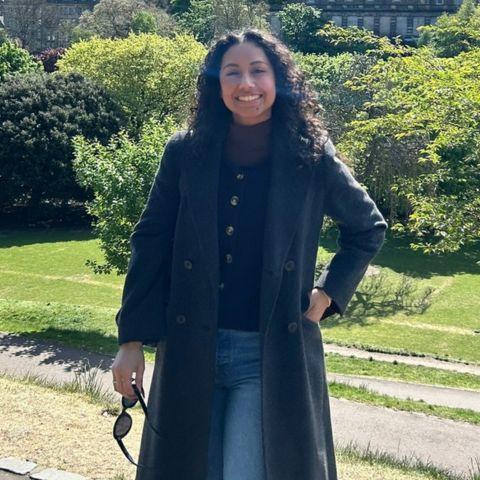
I earned my Bachelor of Arts in Biological Anthropology at the University of California, Santa Barbara. While there, I had the opportunity to intern at our zooarchaeology lab and the stable isotope lab, both experiences that deepened my interest in assessing skeletal trauma and pursuing bioarchaeological and forensic research. After graduating, I was lucky enough to participate in a salvage bioarchaeology project in Romania, where I gained hands-on experience in mortuary archaeology and learned more about building biological profiles using the remains disinterred at my excavation site.
Although I enjoy studying historical populations, my experience shadowing deputy coroners and viewing autopsies at the Orange County Coroner’s Division really shaped my interest in forensic anthropology. I’m excited to learn more about this field at Mercyhurst, but I am especially interested in researching skeletal trauma, paleopathology, and potential indicators of systemic disparities across both historical and modern skeletal populations. After I graduate, I would love to pursue a Ph.D. in Forensic Anthropology and continue working on forensic casework as a medicolegal death investigator.
Entrance: 2024
Sydney Carlson
scarls52@lakers.mercyhurst.edu
B.S. in Applied Forensic Science with a concentration in Forensic Anthropology; minor in Anatomy
Mercyhurst University, Pennsylvania
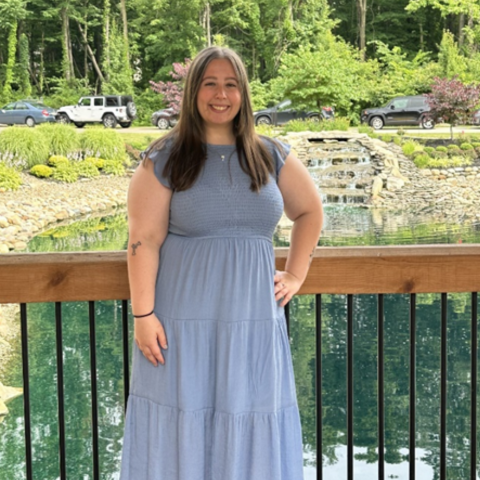
My interest in forensic science started when I was in high school. I explored the field by having conversations with the local forensic pathologist, viewed several autopsies, and also had a short internship in the Pathology department at a local hospital in Cleveland. I gained further interest in forensic anthropology from watching the TV show Bones. These experiences led me to Mercyhurst for my undergraduate degree. I graduated in May of 2024 with a B.S. in Applied Forensic Science with a concentration in Forensic Anthropology and a minor in Anatomy. During my senior year, I was a work-study for the Applied Forensic Sciences department, participated in research, and attended processing. Alongside my studies, these opportunities allowed me to gain hands-on experience with the osteological collection and the Northeast facility. Outside Mercyhurst, I volunteered for the Physical Anthropology department at the Cleveland Museum of Natural History. My volunteering consisted of macerating various primates. My current research interests include forensic taphonomy, clandestine mass grave recovery, and trauma analysis. In the future, I hope to pursue a Ph.D. in Forensic Anthropology with a career in medico-legal death investigation or with the Defense POW/MIA Accounting Agency (DPAA).
Erin Kopec
ekopec68@lakers.mercyhurst.edu
B.S. in Applied Forensic Science with a concentration in Forensic Anthropology; minor in Anatomy
Mercyhurst University, Pennsylvania
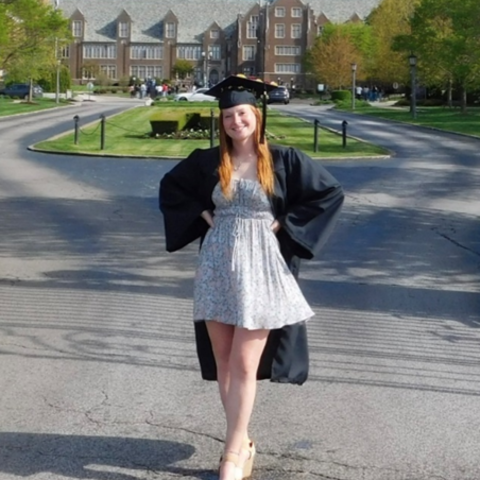
I graduated with a B.S. in Applied Forensic Science with a concentration in Anthropology from Mercyhurst University. While I didn’t have any high school courses to bring me into the world of forensics, I always found it extremely interesting and knew that was what I wanted to do in life. As I continued my way through the program at Mercyhurst, I found myself more interested in it day by day. I completed the Fellowship program and became a work-study at Mercyhurst, where I was given the opportunity to work on multiple cases and projects and open my eyes to the different paths of forensics. After my time in my undergraduate studies, I enrolled in the Forensic Science program at Texas Tech University, where I was able to do research in odor analysis on dried bone using a GC-MS. While I enjoyed my time at Texas Tech, I felt that I would get the best education from Mercyhurst and am excited to be back. My research interests include trauma analysis, odor analysis, and forensic taphonomy. After graduate school, I plan on obtaining my M.D. and becoming a medical examiner.
Samantha Myers
smyers58@lakers.mercyhurst.edu
B.S. in Applied Forensic Science with a concentration in Forensic Anthropology; minor in Anatomy
Mercyhurst University, Pennsylvania
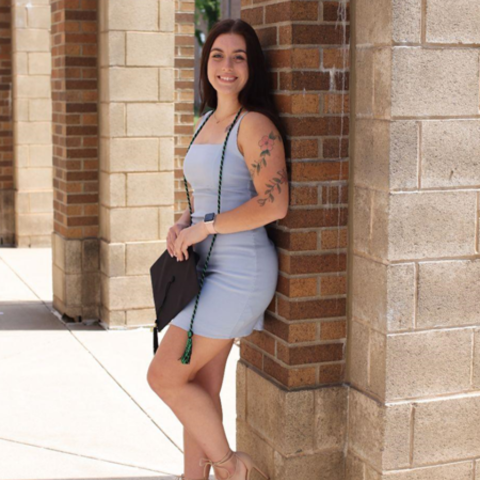
My name is Samantha Myers. I earned my Bachelor of Science in Applied Forensic Science with a concentration in Forensic Anthropology here at Mercyhurst. In my time here, I was given many opportunities, including assisting with casework and participating in the summer Fellowship program where I learned vital skills and further fueled my passion for forensic anthropology. I was also given the opportunity to work in the bone lab as a work-study and spent time processing in the lab in North East. There are many areas within the field that I cannot wait to learn more about, but my biggest interests include dental anatomy, osteology, and taphonomy. In the future, I would like to work alongside law enforcement on forensic casework as a medicolegal death investigator and possibly continue my education and get a Ph.D.
Flavia Rossell Hayes
frosse24@lakers.mercyhurst.edu
B.A. in Anthropology; minor in Forensic Entomology
University of California, Davis
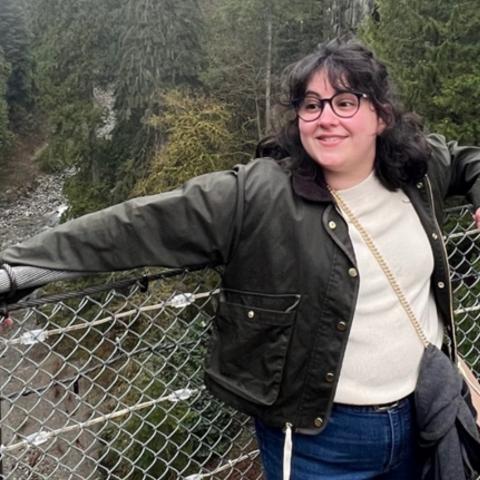
As I’m sure applies to many recent aspiring forensic anthropologists, I first became interested in my field by watching Bones. After earning an associate’s degree in Anthropology at Santa Monica College, I was finally able to get up close and personal with forensics research at the University of California, Davis, where I majored in Anthropology and minored in Forensic Entomology. During my time at UC Davis, I served as a research assistant for a Mercyhurst master’s alum, developing new methods for skeletal identification. I also volunteered in the Human Osteology Lab, inventorying the Anthropology department’s collection of skeletal remains. While my experience so far has primarily been in osteology, I’m excited for the opportunity to expand the breadth of my forensic knowledge at Mercyhurst. My research interests are expansive, including age and sex estimation, taphonomy, forensic odontology, and post-mortem interval. In the future, I hope to work in forensic pathology and medicolegal death investigation.
Edith Torres
etorre50@lakers.mercyhurst.edu
B.S. in Anthropology with a concentration in Forensics; minor in Criminal Justice
Western Carolina University
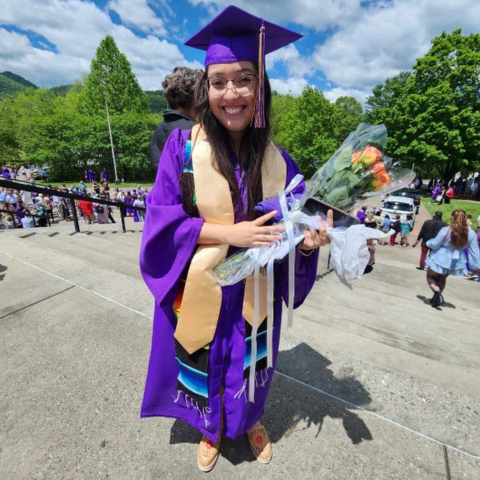
I attended Western Carolina University and earned my B.S. in Anthropology with a concentration in Forensics, along with a minor in Criminal Justice in May 2024. From a young age, I was always captivated by the criminal justice system. My interest in forensic anthropology began to flourish as I read about immigrants who tragically passed away on their journeys and learned about the efforts made toward their identification. As both a daughter and sister to immigrants, I have always been deeply committed to advocating for human rights in this field.
During my time at Western Carolina University, I had the opportunity to further cultivate my passion for Forensic Anthropology by volunteering and interning at the Forensic Osteology Research Station (FOREST) under the mentorship of Dr. Rebecca George and Dr. Katie Zejdlik. Through this experience, I gained valuable lab and field skills, including the opportunity to lead my own team. The knowledge and experience I acquired during my undergraduate studies have motivated me to continue my education to become a more impactful contributor to the field. My academic journey has sparked a strong interest in trauma, skeletal biology, post-mortem intervals, and human rights, which I look forward to exploring further.
In the future, I would like to work in death investigation, human identification, or a related field, possibly right after earning my master's degree or following a Ph.D. program.
Chloe Yingling
cyingl34@lakers.mercyhurst.edu
B.S. in Anthropological Sciences; minors in Forensics and Biological Basis of Behavior
The Ohio State University
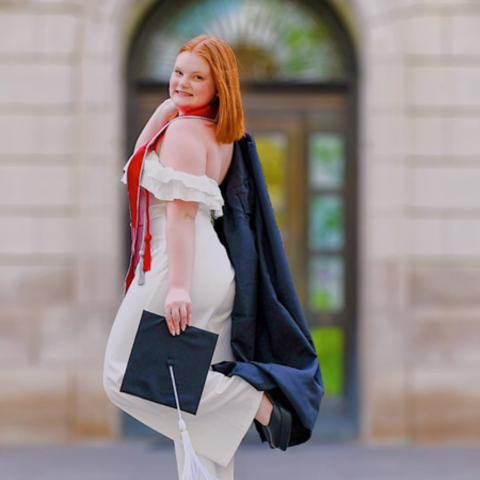
I attended Ohio State University as an undergrad, where I earned a B.S. in Anthropological Sciences and double minors in Forensics and Biological Basis of Behavior. Forensic anthropology has been my life’s passion for as long as I can remember. During my time at OSU, I had the ability to explore and gain invaluable experience in the field. I had the unique opportunity to travel to Poland for a summer, where we focused on excavating a medieval burial ground. While in Poland, I gained skills in excavation, cleaning, and retrieving bones from SITU. In the lab, I gained hands-on experience building biological profiles, handling subadult remains, and identifying highly fragmentary remains. On campus, I became a volunteer at the Injury and Biomechanics Research Center, where I worked under Dr. Amanda Agnew. I was a member of the Bone Processing team, in which I often led other undergrads in the processing of bone specimens to obtain teaching-level quality. Dually, I worked as a lab assistant for Dr. Clark Larsen in the Bioarchaeology Lab. Under Dr. Larsen, I completed multiple projects, in which I was exposed to incredible teaching tools and research. I also was a teacher assistant (TA) for Dr. Larsen in the courses he taught: Human Osteology and Bioarchaeology. In these roles, I was expected to identify, orient, and side various skeletal elements and aid in the knowledge acquisition of these aspects to students. Being a TA is where I discovered my adoration for teaching and mentorship. Following my master’s, I intend to pursue a doctoral degree in a related field that will allow me to continue to teach and mentor others while conducting research. My current research interests include trauma analysis, dental anthropology, gender disparities, and systemic disparities. It is important to me to bring a biocultural, holistic, and intersectional mindset into the research that I conduct. I am excited to have the opportunity to continue my education and research here at Mercyhurst!